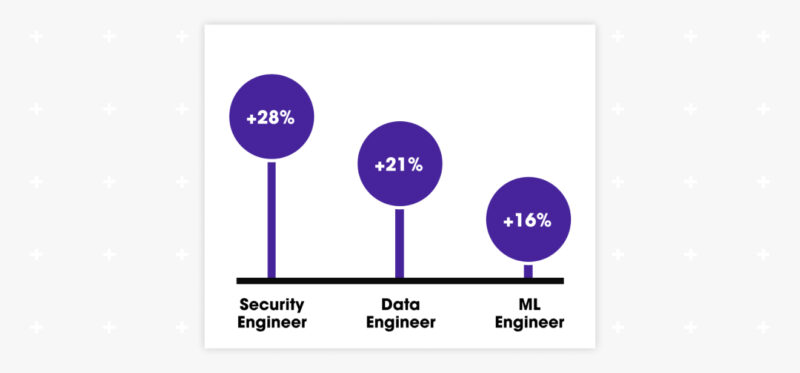
Data Analyst vs. Business Analyst in Tech: What’s the Difference?
Have you ever considered the differences and similarities when comparing a data analyst vs a business analyst? Both data analysts and business analysts work with data and gather insights to drive business forward. On Hired’s talent marketplace, we categorize business analysts as a subrole of the data analyst role. While these positions often overlap, they have unique responsibilities, skill sets, and trajectories that separate them. Let’s delineate the paths of these two roles.
Typical tasks of a data analyst- Data cleaning and processing: They work on refining data, ensuring its accuracy and reliability.
- Data visualization: Data analysts are adept at creating compelling visual narratives through charts and graphs that communicate findings clearly.
- Predictive analysis: They build models to forecast trends, often using machine learning and statistical methods.
- Requirement analysis: Business analysts bridge gaps, illuminating business requirements and needs.
- Process improvement: They continually work on optimizing and improving business processes.
- Stakeholder communication: Being the liaison between stakeholders and solutions teams is a central task, ensuring there is a seamless flow of information and understanding.
Related: Hired’s 2023 State of Tech Salaries Report
Integrating into business frameworksData analyst
Data analysts are the backbone of data-driven decision-making processes, helping organizations understand trends and phenomena, and aiding in strategic planning.
Business analyst
Business analysts, on the other hand, focus on optimizing business processes and ensuring that business objectives are met effectively and efficiently, thereby steering the business toward success.
Educational backgroundA Bachelor’s degree in fields such as computer science, statistics, or related fields is usually the starting point for both roles. The most common Bachelor’s degrees among the interviewed candidates on Hired are math and economics.
Hired data also revealed that more than having a degree or certification alone is often needed to secure a job in the current market. This is because most interviewees have at least a Bachelor’s degree, making it a common requirement.
We also observed an increasing number of people with Master’s degrees in data analytics, business analytics, and data science. Based on Hired’s data for 2023 so far, roughly half of the interviewed candidates hold a Master’s degree, while the other half have a Bachelor’s degree.
Related: Recruiting for Startups
Data analyst
- Advanced degrees: Many data analysts pursue Master’s degrees or PhDs in data science or analytics.
- Specialized courses: There are courses tailored to building knowledge in data analysis, focusing on languages like Python, R, and SQL.
- Common certifications include being Microsoft-certified as a Data Analyst Associate and SAS-certified as a Data Scientist
Business analyst
- MBA: This can be a major boost, offering an advantage in understanding deeper business dynamics.
- Industry-specific knowledge: Business analysts often benefit from knowing the specific industry they are working in, whether it’s finance, healthcare, or IT.
- Common certifications include Certified Business Analysis Professional (CBAP) and PMI Professional in Business Analysis (PMI-PBA)
Note: Hired’s partners, like Ironhack, General Assembly, and Per Scholas, offer data analytics courses and/or boot camps to help candidates unleash their potential and pursue successful careers.
Related: Talent Marketplace Platform: How to Find the Right One
Top skillsData analyst
Data analysts possess a more specialized set of technical skills that are centered on manipulating, analyzing, and visualizing large or complex datasets to extract actionable insights and inform business decisions.
- Proficient use of statistical software like SPSS, SAS, or R for complex data analysis and statistical modeling.
- Strong programming skills in languages such as Python and R for data analysis, manipulation, and automation.
- Advanced knowledge of SQL and experience with relational databases (like MySQL, PostgreSQL) or NoSQL databases (like MongoDB) for complex data querying.
- Expertise in data visualization tools such as Tableau, QlikView, or Power BI for creating advanced visual representations of data.
- Use of tools like Alteryx, KNIME, or data libraries in Python (e.g., pandas) for cleaning and preparing data for analysis.
- Some knowledge of machine learning frameworks (like scikit-learn, TensorFlow) for performing predictive analytics and data modeling.
- Familiarity with big data platforms like Hadoop or Spark can be beneficial for handling large-scale data processing.
- The top five technical skills include:
- Python
- R
- SQL
- Java
- Scala
Related: Hiring a Data Analyst? What to Look for in Top Candidates Now
Business analyst
According to Hired data, the business analyst sub role was among the biggest movers (and the only role within data analytics) to see a positive change in demand, with a 15% increase from 2022 to 2023. Business analysts typically have a more diverse set of technical skills geared towards understanding and managing project requirements, business processes, and the broader implications of data insights for business strategies.
- Familiarity with business intelligence tools like Microsoft Power BI or Oracle BI for creating dashboards and reports that help businesses make decisions.
- Proficiency in using modeling software like Microsoft Visio or Lucidchart for creating business process models, UML diagrams, or system designs.
- Using tools like JIRA, Confluence, or other project management and requirements tracking tools to manage the lifecycle of business requirements.
- Understanding of databases to extract insights and liaise with data professionals; some knowledge of SQL may be required for querying databases.
- High proficiency in Excel for data analysis and manipulation. Being skilled in Word and PowerPoint for documentation and presentations is a plus!
- The top five technical skills include:
- SQL
- Python
- Tableau
- Excel
- Statistics
Related: What Tech Roles Increased Most in Demand in 2023?
SalariesSalaries tend to fluctuate based on experience, industry, and geographic location. However, the average interview request salary for data analysts on Hired is $124,000 and the average salary for business analysts is $116,000.
As a primary role, data analytics average interview request salaries saw the most substantial decrease from 2022 to 2023, dropping 3.2%.
Understanding data analyst and business analyst career pathsWhile there is a symbiotic relationship between data analysts and business analysts, each role has its distinct path and specialization. Think of it like this: Business analysts are typically more involved with the ‘what’ and ‘why’ of business needs and processes, while data analysts focus on the ‘how’ and ‘what’ in terms of data and its implications for business strategy and operations.
With the ever-increasing prominence of big data, understanding what to look for in these roles is crucial. Use this guide as a start in your search for a top business or data analyst.
Want to hire top tech talent? Meet skilled candidates on Hired.Related blog posts

Hiring a Data Analyst? What to Look for in Top Candidates Now
Hiring the right data analyst is crucial for your business. It’s like having a skilled...

Tech Roles on the Rise! What Tech Roles Increased Most in Demand in 2023?
As technology and modern needs evolve, specific tech roles have risen in demand on the Hired tech...

Decreasing Time to Hire: 8 Tips to Improve Your Response Rates from Candidates
Fill Open Roles Faster by Increasing Talent Responses If you’re like most businesses,...

How to Onboard Remote Employees Really Well: Free Checklist Template
What You’ll Learn Things you should do before a new employee’s first day...

4 Ways to Keep Company Culture Alive in Remote & Hybrid Work
After a surge of remote work, employers seem to be less flexible these days. Fewer roles are...

Revolutionizing Recruitment: Walking the Tech Hiring Tightrope (VIDEO)
How do you future-proof recruiting and talent acquisition in this evolving tech landscape? Watch...
